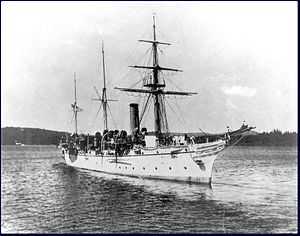HMS Algerine (1895)
 HMS Algerine at Esquimalt. | |
| Career (UK) | |
|---|---|
| Name: | HMS Algerine |
| Builder: | HM Dockyard, Devonport |
| Laid down: | 25 July 1894 |
| Launched: | 6 June 1895 |
| Commissioned: | April 1896[1] |
| Decommissioned: | 8 September 1914 |
| Fate: | Transferred to Royal Canadian Navy, 1917 |
| Career (Canada) | |
| Name: | HMCS Algerine |
| Acquired: | 1917 |
| Fate: |
Sold on 11 April 1919 Wrecked in Principe Channel, British Columbia, 13 October 1923 |
| General characteristics | |
| Type: | Phoenix-class sloop |
| Displacement: | 1050 tons[2] |
| Length: | 185 ft (56 m) pp 210 ft 6 in (64.16 m)oa[1] |
| Beam: | 32 ft 6 in (9.91 m)[1] |
| Draught: | 13 ft 1 in (3.99 m)[1] |
| Installed power: | 1,400 ihp (1,000 kW)[1] |
| Propulsion: | Three-cylinder vertical triple-expansion steam engine Twin screws |
| Sail plan: | Barquentine rigged |
| Speed: | 13 kn (24 km/h)[1] |
| Armament: | Six 4-inch/25-pounder (1-ton) QF guns[1] Four 3-pounder guns |
| Armour: | Protective deck of 1 to 1 1⁄2 in (2.5 to 3.8 cm) steel over machinery and boilers |
HMS Algerine was a Phoenix-class steel screw sloop of the Royal Navy. She was launched at Devonport in 1895, saw action in China during the Boxer Rebellion, and later served on the Pacific Station. She was stripped of her crew at Esquimalt in 1914, and transferred to the Royal Canadian Navy in 1917, being commissioned as HMCS Algerine. She was sold as a salvage vessel in 1919 and wrecked in 1923.
Design
Algerine was a Phoenix-class steel screw sloop mounting 10 guns. She and her sister ship, Phoenix, were designed by Sir William White, the Admiralty Chief Constructor. The class was essentially a twin-screw version of the Alert-class sloop.
Construction
Algerine was constructed of steel and given a protective deck of 1 to 1 1⁄2 in (2.5 to 3.8 cm) steel armour over her machinery and boilers. She was laid down at Devonport Dockyard on 25 July 1894 and launched on 6 June 1895.[1]
Sail plan
As built the class were rigged with a barquentine sail plan (square rigged on the foremast, but fore-and-aft rigged on main and mizzen). This was removed in later years, leaving her dependent on her engines alone.[1]
Propulsion
Algerine was provided with a three-cylinder vertical triple-expansion steam engine developing 1,400 indicated horsepower (1,000 kW) and driving twin screws. The machinery was provided by Devonport Dockyard.[1]
Armament
Her armament consisted primarily of six 4-inch quick-firing guns weighing a ton each and firing a 25 pounds (11 kg) shell. In addition she was fitted with four 3-pounder guns and three machine guns.[1]
Service history
Royal Navy service
Algerine was deployed to the China Station. She recommissioned at Hong Kong and served in Chinese waters during the Boxer Rebellion.[2] In June 1900 Algerine was involved in an attack on the Taku Forts by an international naval force, including contributing to a multi-national landing party, and had 6 men wounded.[3] She also landed a 4-inch gun, and this was used in the capture of Tientsin.[4] Commander Rowland Nugent was appointed in command on 1 May 1902.[5]
.jpg)
Algerine served on the Pacific Station at Esquimalt and on the West Coast of the United States.[4] In 1914 her crew was sent to man HMS Niobe, and the ship lay unused at Esquimalt for most of the First World War.
Royal Canadian Navy and fate
In 1917 Algerine was lent to the Royal Canadian Navy to serve as a depot ship at Esquimalt. She was sold on 11 April 1919 for use as a salvage vessel.[1] In her new guise she was wrecked on 13 October 1923 in the Principe Channel, British Columbia.[6]
See also
![]() Media related to Phoenix class sloop at Wikimedia Commons
Media related to Phoenix class sloop at Wikimedia Commons
References
- Notes
- ↑ 1.0 1.1 1.2 1.3 1.4 1.5 1.6 1.7 1.8 1.9 1.10 1.11 Winfield (2004) p.278
- ↑ 2.0 2.1 "HMS Phoenix at Naval Database website". Retrieved 16 May 2010.
- ↑ "Algerine name history at World Naval Ships website". Retrieved 2 September 2008.
- ↑ 4.0 4.1 "HMS Algerine at Naval Database website". Retrieved 2 September 2008.
- ↑ "Naval & Military intelligence" The Times (London). Saturday, 3 May 1902. (36758), p. 14.
- ↑ "HMCS Algerine at the Canadian Navy Heritage site". Retrieved 16 May 2010.
- Sources
- Winfield, Rif & Lyon, David (2004). The Sail and Steam Navy List: All the Ships of the Royal Navy 1815–1889. London: Chatham Publishing. ISBN 978-1-86176-032-6. OCLC 52620555.
External links
- "Royal Navy Log Books - HMS Algerine". naval-history.net. Retrieved 2013-12-20. OldWeather.org transcription of ship's logbooks August 1914
| ||||||||||